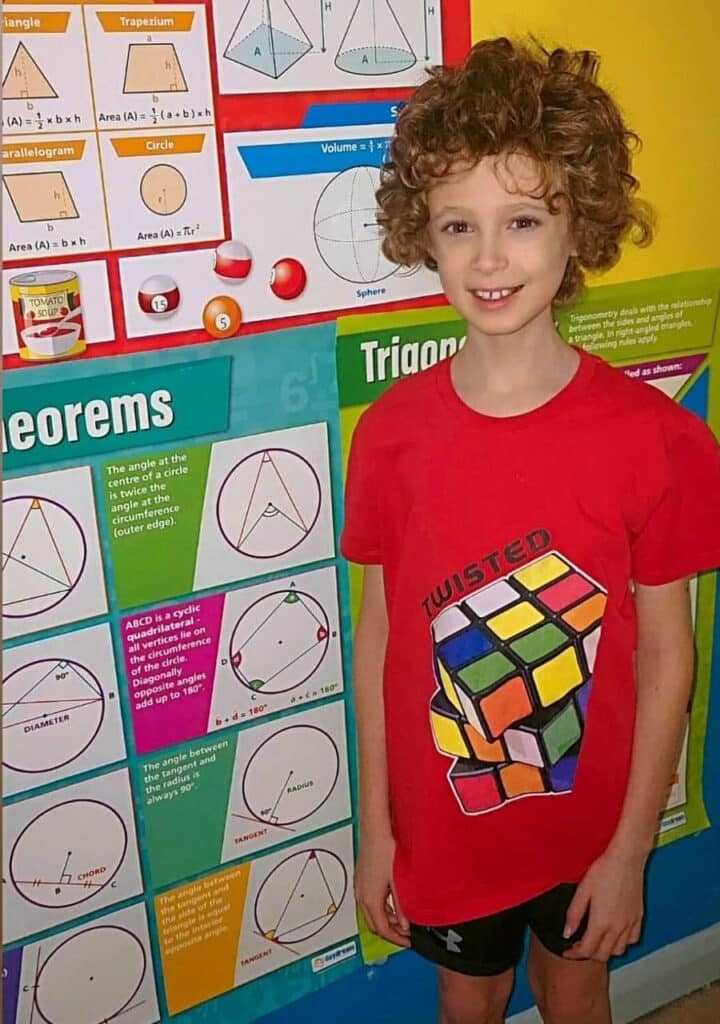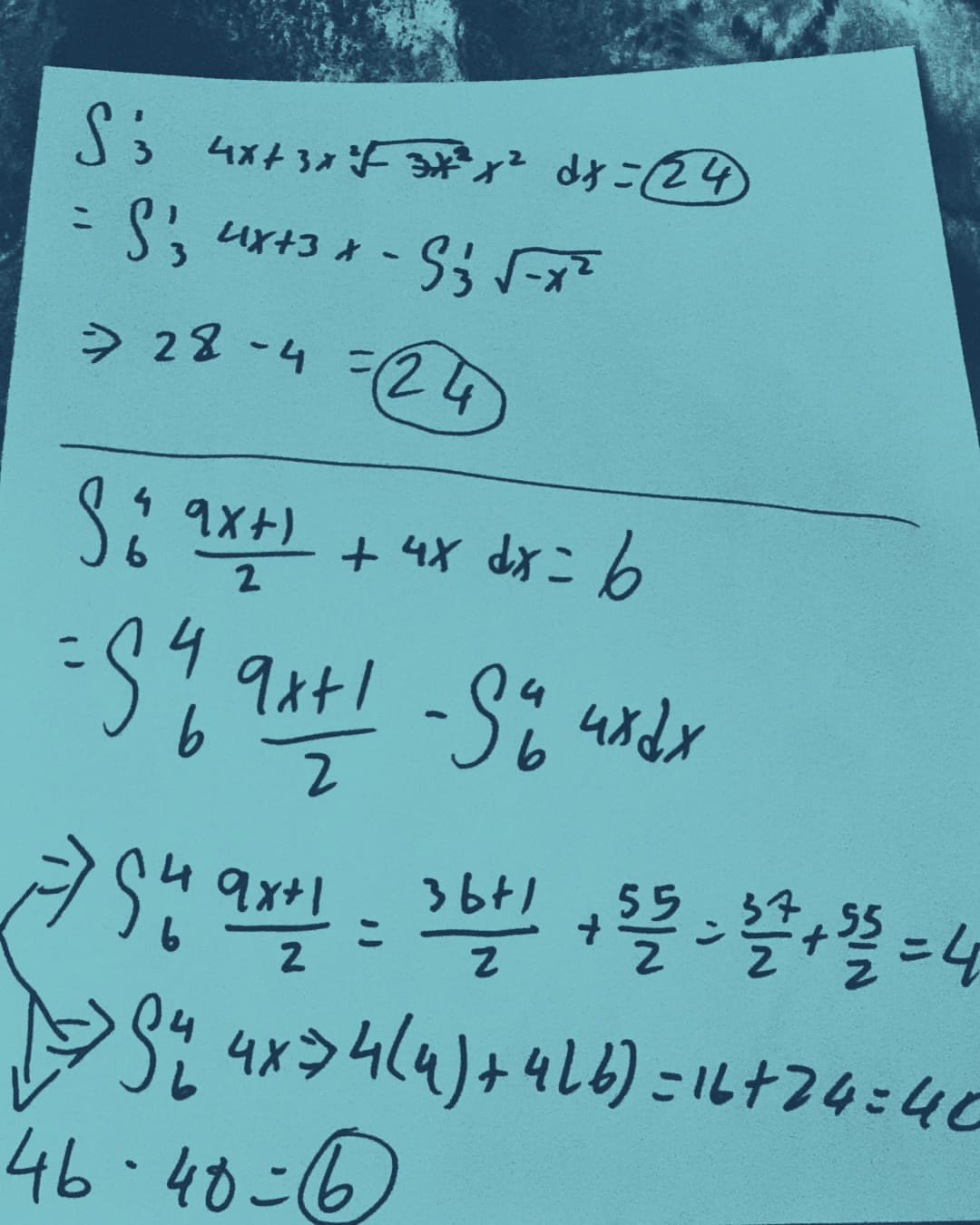When we posed a tricky maths question on our social media accounts in January, we expected two things: a lot of wrong answers, and some correct answers from our maths students. What we didn’t expect, however, was the correct answer from a nine-year-old boy – complete with workings!
Not content with such a simple sum, Josef Sutton's mother, Sanda, also sent us a video of him solving a mind-bogglingly tough equation. With such fantastical formulae being quite beyond our abilities to decipher, we asked one of our maths tutors, Becky Innes, to take a look at the video for us, to check that all was correct. She was rather astonished, to say the least: “This is incredible”, she remarked after watching the video, “it’s called integration by substitution and isn’t taught in UK schools until year 13. Even then, lots of A-level students I’ve taught struggle with this. This is really exceptional.”
[caption id="attachment_167749" align="alignleft" width="720"] Josef Sutton, 9 years old. [/caption]
Here at Oxbridge, we’re passionate about lifelong learning, and that’s what makes us so excited when we see a love and talent for learning at such a young age. Intrigued by Josef’s incredible abilities and curious about his aspirations for the future, we decided to speak with him and his family and find out more about this remarkable little boy.
Josef Sutton, 9 years old. [/caption]
Here at Oxbridge, we’re passionate about lifelong learning, and that’s what makes us so excited when we see a love and talent for learning at such a young age. Intrigued by Josef’s incredible abilities and curious about his aspirations for the future, we decided to speak with him and his family and find out more about this remarkable little boy.
 Josef visits the Mathematical Institute in Oxford at age seven[/caption]
Josef’s talent for maths hasn’t come without its challenges, though, as Sanda explains: “In the past, Josef’s teachers have asked him to help other members of the class with their maths problems because they’ve been overstretched. Whilst this may be helpful for the teachers, we had to put a stop to it – students need to be able to stand on their own two feet and do their own work, which they might not do if they’re relying on Josef for help.”
What does the future have in store for Josef? Well, he’s pretty much set on becoming a maths professor. And if that doesn’t work out, he’d like to become a tennis player. Either way, it seems he’s not short of options!
Josef visits the Mathematical Institute in Oxford at age seven[/caption]
Josef’s talent for maths hasn’t come without its challenges, though, as Sanda explains: “In the past, Josef’s teachers have asked him to help other members of the class with their maths problems because they’ve been overstretched. Whilst this may be helpful for the teachers, we had to put a stop to it – students need to be able to stand on their own two feet and do their own work, which they might not do if they’re relying on Josef for help.”
What does the future have in store for Josef? Well, he’s pretty much set on becoming a maths professor. And if that doesn’t work out, he’d like to become a tennis player. Either way, it seems he’s not short of options!
 Josef Sutton, 9 years old. [/caption]
Here at Oxbridge, we’re passionate about lifelong learning, and that’s what makes us so excited when we see a love and talent for learning at such a young age. Intrigued by Josef’s incredible abilities and curious about his aspirations for the future, we decided to speak with him and his family and find out more about this remarkable little boy.
Josef Sutton, 9 years old. [/caption]
Here at Oxbridge, we’re passionate about lifelong learning, and that’s what makes us so excited when we see a love and talent for learning at such a young age. Intrigued by Josef’s incredible abilities and curious about his aspirations for the future, we decided to speak with him and his family and find out more about this remarkable little boy.
Different from the start
Josef’s parents, Phil and Sanda Sutton, always knew that there was something quite special about Josef. Despite being a regular, cheerful little boy in every aspect, at the age of three, he began to take notice of numbers in rather an unusual way. Phil explains, “He began to notice numerology in many aspects of his life, and he’d always comment on numbers and patterns. I knew enough about kids to know this wasn’t typical, so it was intriguing. When he was around five, he began to take notice of movies and TV shows that contained maths or formulae – I believe the first film he watched that had him fascinated was ‘The Time Machine’, an adaptation of the book by HG Wells. There was also a particular episode of Doctor Who, which contained a scene of a character writing complex algebra on a board, and he couldn’t take his eyes off it! There are most kids captivated by Paw Patrol, and mine’s into quadratic equations!”On track for a Nobel Prize
Not only is Josef a whiz with numbers, but he also has confidence and a single-mindedness that many adults would envy. Josef’s dad remembers that “When he was around seven years old, he was very into a programme called The Joy of Data, presented by mathematician Hannah Fry. I remember one day, she’d just finished solving some complex equations, and she commented that despite everything we know and understand about maths and the natural world, no one has yet been able to produce a theory that unifies quantum mechanics and relativity." She said whoever can do it will win a Nobel Prize. Josef looked at me and said, “I’m going to do that, Dad. And I’m going to win the Nobel Prize.”Nurturing a growing talent
Realising that their son has the potential to achieve great things, Phil and Sanda have done everything they can to nurture Josef’s talent, and help to challenge him in ways that the standard schooling system can’t. “Although we’d love to homeschool Josef permanently,” Phil explains, “that would, unfortunately, be too expensive for us. However, we’ve really enjoyed the little bit of homeschooling we’ve been able to do with him during lockdown. As far as regular school goes, we’ve spoken with Josef’s teachers and they support him as best as they can. However, he requires extra challenges, so he’s regularly given work from other key stages. He’s currently working through year eight maths, and is loving it! He’s also enrolled for online maths tuition with Exemplar. This allows him to work at his level, whilst also ensuring everything he learns is within the national curriculum.” And if you think it’s just maths that Josef has a talent for, think again. Sanda added, “Josef is also a very talented chess player, I think it’s the logistical aspect of the game that really appeals to him. He also loves to design games for his Xbox, he’s also a pretty brilliant tennis player, and he loves reading and writing stories.” [caption id="attachment_167750" align="alignleft" width="695"] Josef visits the Mathematical Institute in Oxford at age seven[/caption]
Josef’s talent for maths hasn’t come without its challenges, though, as Sanda explains: “In the past, Josef’s teachers have asked him to help other members of the class with their maths problems because they’ve been overstretched. Whilst this may be helpful for the teachers, we had to put a stop to it – students need to be able to stand on their own two feet and do their own work, which they might not do if they’re relying on Josef for help.”
What does the future have in store for Josef? Well, he’s pretty much set on becoming a maths professor. And if that doesn’t work out, he’d like to become a tennis player. Either way, it seems he’s not short of options!
Josef visits the Mathematical Institute in Oxford at age seven[/caption]
Josef’s talent for maths hasn’t come without its challenges, though, as Sanda explains: “In the past, Josef’s teachers have asked him to help other members of the class with their maths problems because they’ve been overstretched. Whilst this may be helpful for the teachers, we had to put a stop to it – students need to be able to stand on their own two feet and do their own work, which they might not do if they’re relying on Josef for help.”
What does the future have in store for Josef? Well, he’s pretty much set on becoming a maths professor. And if that doesn’t work out, he’d like to become a tennis player. Either way, it seems he’s not short of options!
